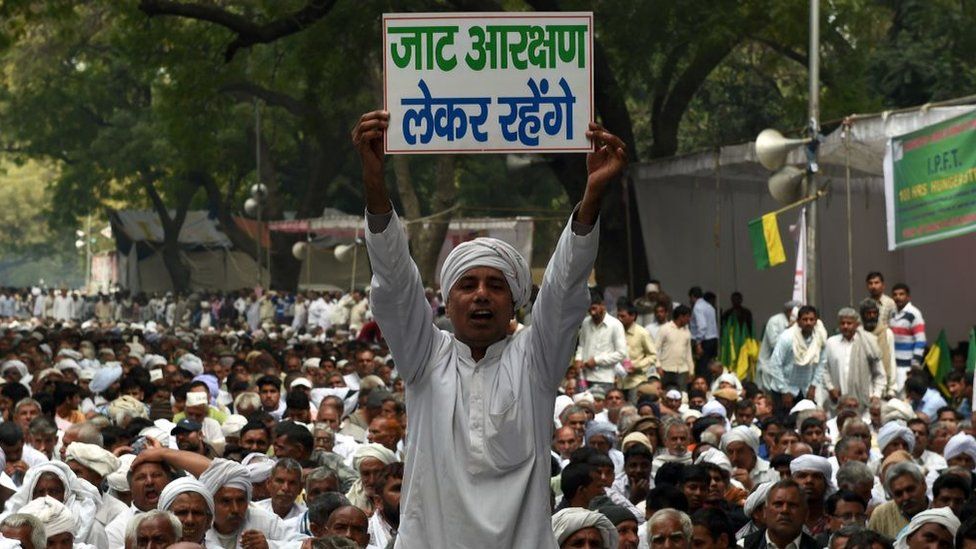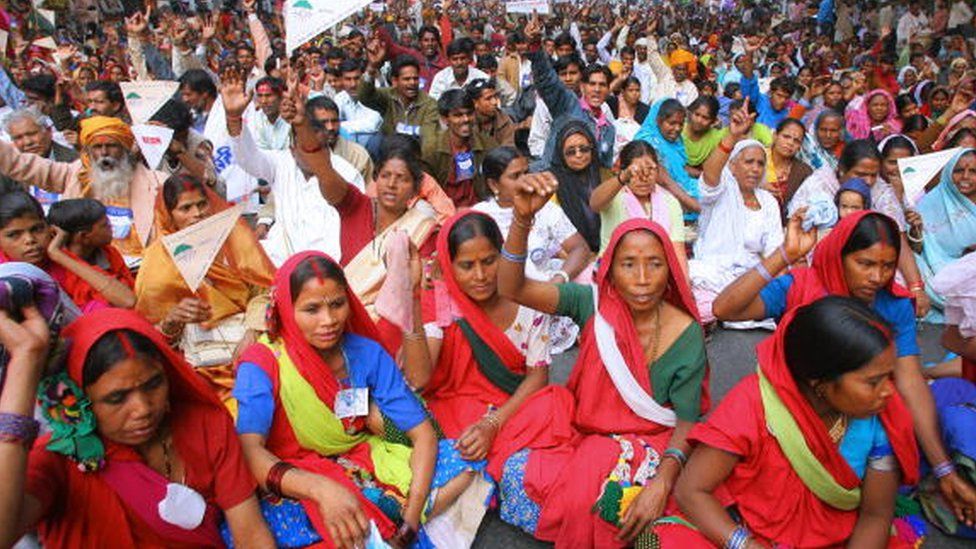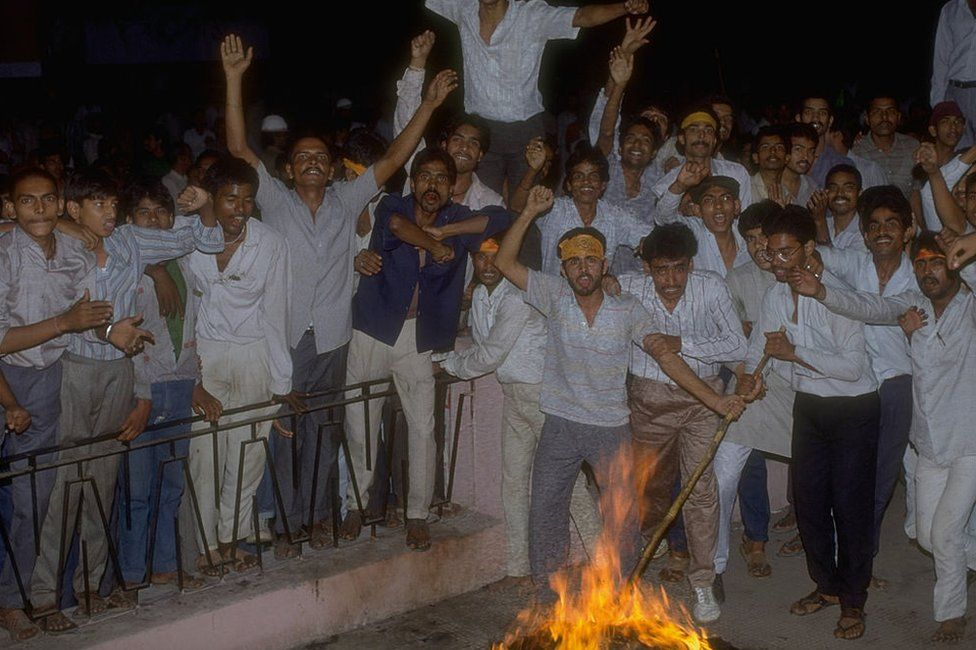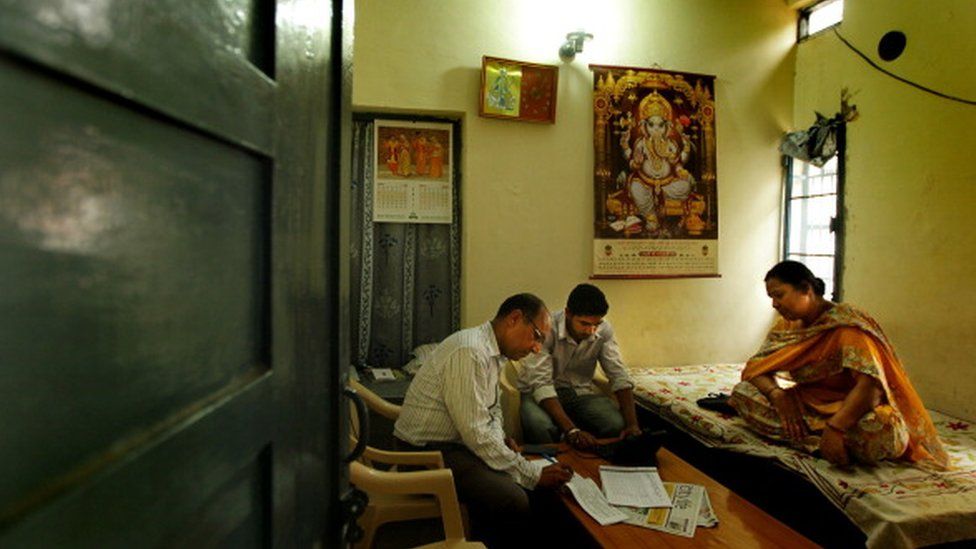The controversy over India caste census explained

IMAGE SOURCEGETTY IMAGESimage caption
Critics say the BJP fears that a caste count could spark more demands for quotas
Major opposition and regional leaders have met India's Prime Minister Narendra Modi to argue in favour of counting caste in the country's census.
"A caste census will be a historic, pro-poor measure," Tejashwi Yadav, a leader of the regional Rashtriya Janata Dal (RJD), was quoted as saying by the Press Trust of India.
Mr Modi's Bharatiya Janata Party's decision not to do so has sparked a political maelstrom.
Hinduism's deeply hierarchical and oppressive caste system, which dates back some 2,000 years, puts Brahmins or priests at the top, and Dalits (formerly untouchables) and Adivasis (tribespeople) at the bottom.
Major opposition and regional leaders have met India's Prime Minister Narendra Modi to argue in favour of counting caste in the country's census.
"A caste census will be a historic, pro-poor measure," Tejashwi Yadav, a leader of the regional Rashtriya Janata Dal (RJD), was quoted as saying by the Press Trust of India.
Mr Modi's Bharatiya Janata Party's decision not to do so has sparked a political maelstrom.
Hinduism's deeply hierarchical and oppressive caste system, which dates back some 2,000 years, puts Brahmins or priests at the top, and Dalits (formerly untouchables) and Adivasis (tribespeople) at the bottom.

Members of the lowest Hindu varna, the Shudras (artisans and labourers), and people below the four-varna system altogether are regarded as theoretically ineligible to study or even to listen to the Vedas, a collection of hymns in archaic Sanskrit.
Thus, the Dalits (once described as 'Pariahs' or 'Untouchables', and then renamed by Gandhi as 'Harijans' or 'People dedicated to Vishnu' or effectively 'Children of God') lie even OUTSIDE the 4-tier caste system (in other words the Dalits do not belong to any caste or are below the 4-tier caste system).
The so-called 'Untouchables' rejected the name of 'Harijans' as patronising and called themselves as 'Dalits' meaning 'scattered/broken'.
In between are a multitude of castes - it's hard to even say how many because there is no list that has enumerated them all.
But there is a swathe of lower and intermediate castes, which are roughly believed to constitute about 52% of the population, that are recognised as Other Backward Classes or OBCs.
While India's census, which happens every 10 years, has always recorded the population of Dalits and Adivasis, it has never counted OBCs.
Now, several political parties, including BJP's allies, are demanding a caste census - essentially a count of OBCs. However, the government has refused.
But there is a swathe of lower and intermediate castes, which are roughly believed to constitute about 52% of the population, that are recognised as Other Backward Classes or OBCs.
While India's census, which happens every 10 years, has always recorded the population of Dalits and Adivasis, it has never counted OBCs.
Now, several political parties, including BJP's allies, are demanding a caste census - essentially a count of OBCs. However, the government has refused.
Why is the BJP opposed to a caste census?
The ruling party has said it will not do a caste count "as a matter of policy", but critics say the move is calculated.
Elections are due next year in the battleground state of Uttar Pradesh, and experts believe the BJP is reluctant to stir any issues that may bring unwelcome surprises - especially after it was routed in recent state polls in West Bengal.
Caste is a crucial factor in every Indian election, from the village council to the parliament. More so in Uttar Pradesh, where the BJP's power and popularity rest on a delicately forged alliance of castes, and especially those in the OBC category.
A caste count could cause fissures in the Hindu vote, which the BJP has managed to consolidate in recent years, despite deep divisions that underpin the party's plank of Hindu unity.
The government has also argued that it would lead to the perpetuation of caste identities - but lower castes say that identity is a reality they grapple with everyday and only the privileged can afford to overlook caste.
Critics say there's another reason for the BJP's reluctance. Counting OBCs would reveal what a large proportion of the population they make up, but how little of it comprises upper castes, who nevertheless dominate politics and bureaucracy, because of centuries of privilege afforded by wealth and education.
Does India need a caste census?
Given that the census already records a gamut of data, from religion to language to socio-economic status, and also counts Dalits and Adivasis, many experts say there is no good reason not to count OBCs.
They are the targets of some of India's biggest affirmative action programmes - quotas in government jobs and colleges - and by most estimates account for a little over half the population.

The ruling party has said it will not do a caste count "as a matter of policy", but critics say the move is calculated.
Elections are due next year in the battleground state of Uttar Pradesh, and experts believe the BJP is reluctant to stir any issues that may bring unwelcome surprises - especially after it was routed in recent state polls in West Bengal.
Caste is a crucial factor in every Indian election, from the village council to the parliament. More so in Uttar Pradesh, where the BJP's power and popularity rest on a delicately forged alliance of castes, and especially those in the OBC category.
A caste count could cause fissures in the Hindu vote, which the BJP has managed to consolidate in recent years, despite deep divisions that underpin the party's plank of Hindu unity.
The government has also argued that it would lead to the perpetuation of caste identities - but lower castes say that identity is a reality they grapple with everyday and only the privileged can afford to overlook caste.
Critics say there's another reason for the BJP's reluctance. Counting OBCs would reveal what a large proportion of the population they make up, but how little of it comprises upper castes, who nevertheless dominate politics and bureaucracy, because of centuries of privilege afforded by wealth and education.
Does India need a caste census?
Given that the census already records a gamut of data, from religion to language to socio-economic status, and also counts Dalits and Adivasis, many experts say there is no good reason not to count OBCs.
They are the targets of some of India's biggest affirmative action programmes - quotas in government jobs and colleges - and by most estimates account for a little over half the population.

IMAGE SOURCEGETTY IMAGESimage caption
Dalits, among India's most marginalised groups, are at the bottom of the Hindu caste system
Economists and policy makers have long argued that counting OBCs can better inform government programmes and efforts.
It's far from uncommon for governments to do this. The United States counts people by race and the UK enumerates country of origin for its immigrant population.
In fact, the British, who began India's census operations in 1872, counted all castes until 1931.
However, since 1951, independent India's census only counted the castes of Dalits and Adivasis, referred to as scheduled castes and tribes respectively. Everyone else's caste was marked as general.
Has India ever counted its OBC population?
Not really - there have been estimates but there is no official, published data.
The 1980s saw the rise of several regional caste-based parties that challenged the dominance of upper castes in India's two major national parties - Prime Minister Narendra Modi's BJP and the main opposition Congress.
This also mobilised lower castes to demand quotas in government jobs and colleges across India.
Since 1950, India has reserved government jobs, college admissions and elected seats - from village councils to the parliament - for Dalits and Adivasis to rectify historical wrongs that have denied them equal opportunities.
While the constitution allows the same for "other socially and educationally backward classes", it doesn't specify or define who they are.
In 1979 the federal government appointed a commission to identify these castes and determine whether existing affirmative action programmes must be extended to them.

Economists and policy makers have long argued that counting OBCs can better inform government programmes and efforts.
It's far from uncommon for governments to do this. The United States counts people by race and the UK enumerates country of origin for its immigrant population.
In fact, the British, who began India's census operations in 1872, counted all castes until 1931.
However, since 1951, independent India's census only counted the castes of Dalits and Adivasis, referred to as scheduled castes and tribes respectively. Everyone else's caste was marked as general.
Has India ever counted its OBC population?
Not really - there have been estimates but there is no official, published data.
The 1980s saw the rise of several regional caste-based parties that challenged the dominance of upper castes in India's two major national parties - Prime Minister Narendra Modi's BJP and the main opposition Congress.
This also mobilised lower castes to demand quotas in government jobs and colleges across India.
Since 1950, India has reserved government jobs, college admissions and elected seats - from village councils to the parliament - for Dalits and Adivasis to rectify historical wrongs that have denied them equal opportunities.
While the constitution allows the same for "other socially and educationally backward classes", it doesn't specify or define who they are.
In 1979 the federal government appointed a commission to identify these castes and determine whether existing affirmative action programmes must be extended to them.

IMAGE SOURCEGETTY IMAGESimage caption
The Mandal commission report sparked huge protests by upper caste students
The Mandal commission, named after the MP who headed it, recommended extending the quotas to OBCs - but this wasn't implemented until 1990 by a National Front government led by VP Singh.
It was met with huge protests from upper caste groups, especially students - the Indian economy had not yet opened up then and limited government jobs and college seats were in high demand.
The BJP is not the first to rebuff an OBC count. Successive Congress-led governments have also shied away from it. The Congress was forced to concede in 2010 when an overwhelming majority of MPs supported a caste census.
The results of the Socio-Economic and Caste Census initiated in 2011 were never released.

The Mandal commission, named after the MP who headed it, recommended extending the quotas to OBCs - but this wasn't implemented until 1990 by a National Front government led by VP Singh.
It was met with huge protests from upper caste groups, especially students - the Indian economy had not yet opened up then and limited government jobs and college seats were in high demand.
The BJP is not the first to rebuff an OBC count. Successive Congress-led governments have also shied away from it. The Congress was forced to concede in 2010 when an overwhelming majority of MPs supported a caste census.
The results of the Socio-Economic and Caste Census initiated in 2011 were never released.

IMAGE SOURCEGETTY IMAGESimage caption
India's exhaustive census has never counted OBCs
Critics say a new count would reveal how the OBC population is well in excess of the 52% identified by the Mandal commission, spurring demands for more quotas. And the timing wouldn't be worse for the BJP.
Data suggests the party has done well among OBCs, especially in UP in the last two elections, but a renewed demand for quotas will put it in a tough spot.
The BJP is still an upper caste party - and more important, if it alienates the OBC vote, that could give the opposition a much-needed platform to counter the BJP.
Critics say a new count would reveal how the OBC population is well in excess of the 52% identified by the Mandal commission, spurring demands for more quotas. And the timing wouldn't be worse for the BJP.
Data suggests the party has done well among OBCs, especially in UP in the last two elections, but a renewed demand for quotas will put it in a tough spot.
The BJP is still an upper caste party - and more important, if it alienates the OBC vote, that could give the opposition a much-needed platform to counter the BJP.
Yindia may have a cursed caste system but their voters have no problem with non-Hindu Presidents or Prime Ministers.
ReplyDelete80% of their population is Hindu, Muslims 16%, Sikhs only 1.72%. But....
Prime Ministers:
Jawaharal Nehru (Muslim)
Charan Singh
Vishvanath Pratap Singh
Manmohan Singh
Presidents:
Zakir Hussein Khan (Muslim)
Fakhruddin Ali Ahmed (Muslim)
Giani Zail Singh
K. R. Narayanan was the first Dalit President of India (1997-2002)
Shrimati Pratibha Singh Patil
So when will Malay-sia elect Gobind Singh as PM? Even DPM will be a good start.
But everybody say "impossible", "get real", "ketuanan rules forever", "the majority must always rule"...nobody push for it, everybody laugh at me ha ha ha...
So let's not worry about Yindia, focus on Malay-sia.
cherry picking again? what about Sonia Gandhi?
DeleteDon't forget, u r talking to aacow worshipping pariah!
DeleteSonia Gandhi an Italian born Catholic naturalized Indian, while not PM herself, was the Chairperson of the National Advisory Council (NAC) formed to advise the Prime Minister Manmohan Singh.
DeleteThe Malaysian equivalent of this scenario would be Catholic Teresa Kok as Advisor to PM Gobind Singh. Pak Hadi will have a heart attack…..ha ha ha…
accept Sonia? wakakaka
DeleteWhat a f*cked argument in asking for a distinctive study to eliminate poverty & discrimination.
ReplyDeleteIf u r poor & destiture then all yr behaviours, possessions & societal treatments would reflect such state of being!
The called for studies r just superfluous.
Helping the poors & destitutes cut across ANY boundaries, man-made or natural!
If helps r conditional then they r no helps but evil schemings using the humanistic tendency to profit!
Ah.. Caste..the principal bane that is holding India back on its progress to a superpower.
ReplyDeleteDon't forgetting the glaring fact that almost ALL Indian intellects of substance r not willing to sacrifice to go back to work for their mother India!
DeleteAll of them r runners, willingly chasing an established sopo environment, usually a westernised one, to built their bases of idealised lifestyle.
Even worst r those super rich Indians who r shamelessly exploiting the cheap India local business conditions to fill their incessant craving of wealth. Their contributions to the sopo well-being of India r next to zero.
W/O talents to work in local harsh conditions with low pays. & rich businessmen unwillingly to invest in venture for the good of India. Coupled with a loud mouth & jealousy-filled administration - how could India ever evolve?